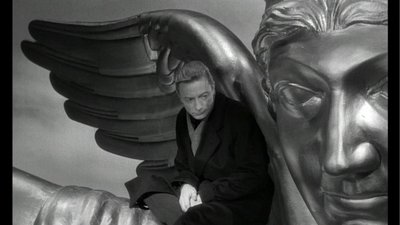Otto Sander has died.
I wish I'd seen him onstage. I knew him only as Cassiel, the sharp-faced, sandy-haired angel of Der Himmel über Berlin (Wings of Desire, 1987), the one who listens to the storyteller, the one who does not fall, and that was reason enough for me to love him. I wrote about him a little in 2005, after seeing the film for the first time on a big screen at the Brattle:
True to form, it's the other angel—Cassiel, who does not choose to become mortal—who has always interested me, perhaps because he's less identifiable for the audience. Damiel's reasons for transformation are human: restlessness, desire, what it's like to feel time pass, what it's like to have choices and to change, so that even as an angel we understand him. Cassiel's priorities, conversely, are all those of a recording angel. He is an assiduous observer of Berlin. In the same way that Damiel watches the beautiful trapeze artist, Cassiel follows an old storyteller: history, not love, catches his attention. He's not detached: he cries out when he cannot prevent a suicide. At the moment when Damiel chooses to descend, to come into life and someday to die, Cassiel holds the transitioning angel in his arms like a fallen comrade. But he seems entirely disinterested in the experience of mortality. I don't know if there is anything he would want enough to descend for. Maybe, at least in Wim Wenders' world, that's the difference between angels and humans. Eternity is a closed system. Desire is of the world.
I should watch In weiter Ferne, so nah! (Faraway, So Close!, 1993) now; I've never seen it. It was always supposed to be the lesser of the two films, despite starring the angel I cared about more. I still don't know what it was that made him change his mind: stumble, leap, take on the colors of the world and the risks of time. I like the idea of Sander as an observing angel of Berlin theater, sitting up in the rafters with his long coat and his ponytail, his notebook of the city he made his eternity's study, taking down all the stories he will never be part of, skeptic and scholar of heaven, not forgetting the taste of coffee or cigarettes.

I wish I'd seen him onstage. I knew him only as Cassiel, the sharp-faced, sandy-haired angel of Der Himmel über Berlin (Wings of Desire, 1987), the one who listens to the storyteller, the one who does not fall, and that was reason enough for me to love him. I wrote about him a little in 2005, after seeing the film for the first time on a big screen at the Brattle:
True to form, it's the other angel—Cassiel, who does not choose to become mortal—who has always interested me, perhaps because he's less identifiable for the audience. Damiel's reasons for transformation are human: restlessness, desire, what it's like to feel time pass, what it's like to have choices and to change, so that even as an angel we understand him. Cassiel's priorities, conversely, are all those of a recording angel. He is an assiduous observer of Berlin. In the same way that Damiel watches the beautiful trapeze artist, Cassiel follows an old storyteller: history, not love, catches his attention. He's not detached: he cries out when he cannot prevent a suicide. At the moment when Damiel chooses to descend, to come into life and someday to die, Cassiel holds the transitioning angel in his arms like a fallen comrade. But he seems entirely disinterested in the experience of mortality. I don't know if there is anything he would want enough to descend for. Maybe, at least in Wim Wenders' world, that's the difference between angels and humans. Eternity is a closed system. Desire is of the world.
I should watch In weiter Ferne, so nah! (Faraway, So Close!, 1993) now; I've never seen it. It was always supposed to be the lesser of the two films, despite starring the angel I cared about more. I still don't know what it was that made him change his mind: stumble, leap, take on the colors of the world and the risks of time. I like the idea of Sander as an observing angel of Berlin theater, sitting up in the rafters with his long coat and his ponytail, his notebook of the city he made his eternity's study, taking down all the stories he will never be part of, skeptic and scholar of heaven, not forgetting the taste of coffee or cigarettes.
